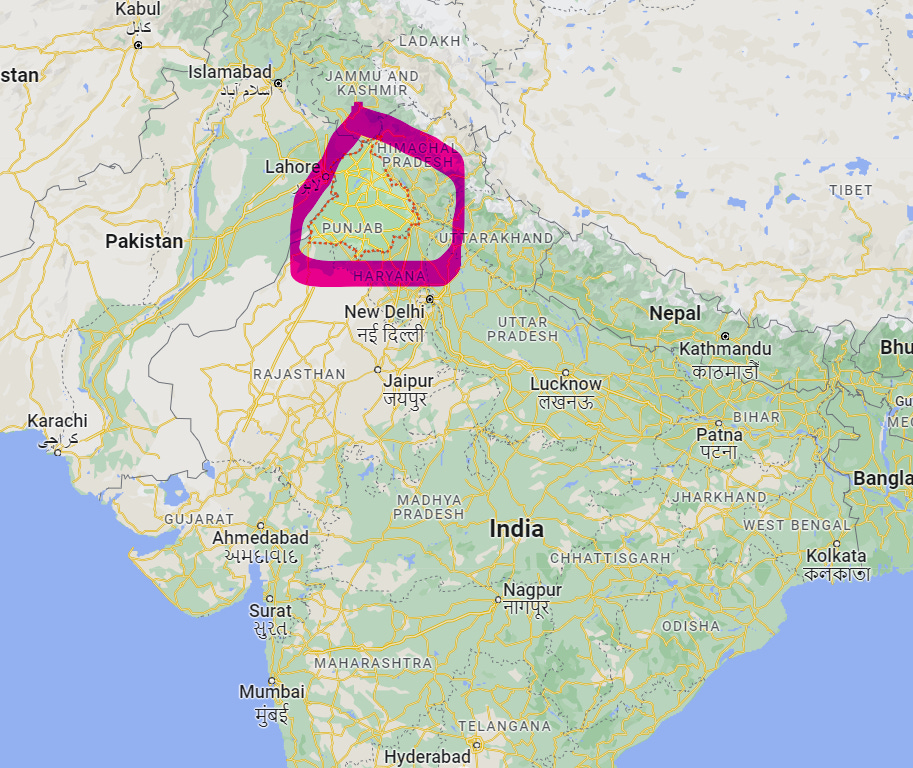Did The Indian Government Really Assassinate Some Dude In Canada?
Maybe. But first, some context:
Punjab, Explained. (Sort Of.)
To be able to understand what’s going on today, you sort of need to understand the dynamics within India, and specifically, re: Punjab vs. the rest of India. So what’s Punjab?
Punjab (pronounced “pun-job” and not “poon-jahb” or any of the other nonsense I’ve heard people say) is a state in the north of India. Here’s a map:

There’s a lot of complexity to what I’m about to get into next, and for the sake of not writing a novel here, I’m going to edit heavily. For the full history, Wikipedia does a great job in its History of Punjab, and I’d suggest starting with the Founding of Sikhism.
One of the big hurdles we need to overcome here is the typical perception of “India” as being made up of just “Indians.” I mean, it’s true, but…not exactly. India is basically a hodgepodge of a number of different cultures / sub-groups / religions, all under that one flag with the wheel in the middle of it. But if there’s one lesson of geopolitics we’ve learned the hard way (over centuries, wars, etc.), it’s that just because you draw a few lines on a map and give people flags, doesn’t mean everyone just melts together and unifies within the neat little flagged boxes you’ve only just created.
But ok, so, Punjab. Punjab is kind of like to India what Scotland is to the UK. Its people are typically physically of large stature, it’s got a high proportional representation in the national military, it’s got a proportionally large share of the country’s natural resources (here, e.g., water), and the rest of the country really benefits from it being a part of the whole. The population of Punjab is majority Sikh, which is a wholly separate religion from Hinduism (the religion most commonly associated with India).1
Separatists.
Anyway, even from the time of India’s independence, there were calls for the formation of a separate country for Punjab, referred to as “Khalistan.” Obviously, when the region was partitioned in 1947, Khalistan never came into being. The Punjab region got cut up and divided between India and Pakistan (that’s actually what the “P” in Pakistan stands for), and everyone lived happily ever after, because of all of the super official-looking borders and flags. Right?
Obviously not.
In the years since, there’s been a lot of clamor around the movement for an independent, autonomous, or semi-autonomous Punjab from / within India, even leading to the assassination of an Indian Prime Minister shortly after a botched military operation against Sikh separatists. There was a tidal wave of anti-Sikh sentiment and violence that followed (even more so than what preceded), but, in a stunning move, India elected, and then re-elected, a Sikh Prime Minister (in 2004 and 2009, respectively). So it’s all good now, right?
Sigh. Obviously not.
Since the 2010s, the Khalistan movement has both surged and taken a turn towards violence, followed by police crackdowns and more violence, and so on as you go. In the context of politics and separatist violence, it might make more sense to think of Punjab, at least since 2010, as being less like Scotland and more like Northern Ireland during the Troubles.
And so, with that sort of whirlwind history out of the way, it’s time to turn to what’s been happening lately.
Enter, Nijjar.
The guy at the center of the current Canada-India controversy is a Sikh man by the name of Hardeep Singh Nijjar.
What’s irrefutably true about Nijjar is as follows: he was Sikh; he was born in Punjab; he’d been living in Canada for the past several years and crucially, had become a Canadian citizen; he’d served as the president of a Sikh temple in Surrey, BC, Canada (a suburb of Vancouver with a large Sikh population); and he was murdered in Canada by unknown masked gunmen in June of this year.
Now, what’s alleged is that Nijjar was, until his death, the head of the Khalistan Tigers, a pro-Khalistan separatist group accused of orchestrating targeted killings and other acts of violence within India and elsewhere in the world. It’s this allegation, by the Indian government, that put Nijjar directly within the sights of India’s intelligence and law enforcement agencies.
Current Events.
In February of 2018, Canadian PM Justin Trudeau met with the Chief Minister (our version of Governor) of Punjab, Amarinder Singh, in the city of Amritsar, Punjab, India. And it’s at this meeting that Singh (notably, also a Sikh) gave Trudeau a list of names of wanted persons believed to be in Canada. Nijjar was on that list. In April of that year, the Royal Canadian Mounted Police (RCMP) took Nijjar into custody and questioned him, but released him after 24 hours with no charges filed, and certainly no extradition to India.
On 18 June 2023, Nijjar was shot dead by gunmen while sitting in his vehicle in the parking lot of a Sikh temple in Surrey, BC, Canada. In the months since then, the RCMP have made no arrests in connection with the killing, and the investigation remains ongoing.
On 18 September 2023, at the G-20 summit in New Delhi, India, Trudeau informed Indian PM Narendra Modi that Canadian Intelligence had identified a link between the killing of Nijjar and the government of India. This, as you might have seen coming, did not go well. India made a categorical denial and called the allegations “absurd.” Canada then expelled an Indian diplomat from Canada. India then expelled a Canadian diplomat from India. And that sort of brings us up to today.
Now, what we all want to know, but don’t yet know, is exactly what sort of evidence the Canadian government has to back up its claim. Absent a public disclosure of the evidence, are we to just take Trudeau’s word for it? Maybe. But maybe we don’t have to. There’s already been a strong, albeit circumstantial, indicator of how solid the evidence actually is.
Spy Stuff.
To get into it, we need to back up a bit and talk about the expulsions. On face, they seem kind of stupid, right? Like, ok, so an Indian guy has to go back to India, a Canadian guy has to go back to Canada. Doesn’t seem like a big deal.
But beyond the surface, there’s a game being played in the context of diplomacy / intelligence / counterintelligence, and to get to this—and to understand how serious it is—we have to take a quick detour into the world of foreign intelligence.
When you read the words “foreign intelligence,” I’d say a great many of you immediately think of the CIA. (Or maybe MI6, for the James Bond fans out there.) But just about every country out there has its own foreign intelligence service. India’s is its Research & Analysis Wing (or, “RAW”), and Canada’s is “CSIS,” or the Canadian Security Intelligence Service. The CIA, MI6, CSIS and RAW, at least on paper, all do roughly the same job: collect intelligence, generally from foreign sources, for the benefit of their respective nation’s policymakers. This happens inside “hostile” countries (think back to the Cold War days) but also inside “friendly” or allied countries. That’s sort of a weird thing to think about, right? We’re spying on our friends? They’re spying on us? In a word: yes. But it’s tricky. If you ask me, the game of foreign intelligence collection is best summed up by a *legendary* line from the 1999 classic of American cinema, Cruel Intentions: “Cecile, everybody does it, it’s just that nobody talks about it.”
In just about every embassy across the world, there exists a “station” of the delegation nation’s foreign intelligence service. (E.g., inside the US Embassy in Kuala Lumpur, one might expect to find the CIA station for Malaysia, and so on.) But it’s not as though there’s a sign at the gate that says “CIA Station” right underneath “Embassy of the United States of America.” It’s most certainly there, but like Kathryn says to Cecile in that infamous film scene, “nobody talks about it.”
This sort of tacit, and also secret, existence applies not just to the station itself, but also to the personnel working within it. For example, while a CIA station would have a head, or “station chief,” running it, the identity of the person holding the role may or may not be disclosed to the receiving nation (the country “receiving” the foreign diplomatic delegation). Depending on a wide variety of factors, the US might say to the receiving nation, “Hey, Bob Smith is our chief of station in your country,” or, alternatively, “What? No. Bob Smith is an officer in the political section of the embassy. The CIA chief of station? Yeah, no, that’s…*mumbles in spy talk.*” In official terms, we call the former “declared status” and the latter “undeclared status.” Even when declared, the identities of intelligence personnel are heavily guarded secrets. And even among friendly nations, intelligence personnel may go undeclared for fear of leaks from within the receiving nation’s government. Spying, in short, is a fraught business. Secrecy is vital.
Now, let’s return to the business of expulsions. Normally, when a country expels a diplomat of a foreign nation, it sends that nation’s embassy a notice stating that “so-and-so” is now persona non grata (or “PNG”). PNG status means that the subject individual is no longer welcome in the receiving nation, and that person is typically recalled back to their home country. Now, diplomats “get PNG’d” for any number of reasons, such as for breaking local laws (particularly in cases where there’s immunity from prosecution under the Vienna Convention). In the case at hand, though, I somehow don’t think we’re talking about a fat stack of unpaid parking tickets, because Canada didn’t just quietly send the Indian Embassy in Ottawa a PNG notice. No, no, they instead held a press conference. (Buckle up, everyone.)
Here’s my summary (annotated) of the presser conducted by Canadian Foreign Minister Mélanie Joly:
If the Indian government was actually involved in the murder of a Canadian citizen on Canadian soil, that would be an unacceptable violation of Canadian sovereignty. Ok, expected.
We are committed to finding out the truth, and expect India’s full cooperation in our efforts. Lip service. They already told you to go pound sand at the G-20.
We’re expelling a top Indian diplomat from Canada. Ok, so you guys are serious.
The diplomat we’re expelling is Pavan Kumar Rai. Ok, so you guys are *really* serious, naming names and all.
Pavan Kumar Rai is the RAW station chief in Canada. *sputters*…did you guys just out a spy?? Of a country that’s supposed to be an ally?!?
As the kids these days say, “big yikes.” Huge yikes, even.
In my mind, there’s two possible scenarios here:
Trudeau, Joly, and the whole of the Canadian government are a bunch of idiots, and they recklessly outed the identity of a senior member of a (former?) ally’s intelligence service without sufficient cause or rationale; or
Trudeau & Co. are holding aces (viz., pretty solid evidence). They aren’t willing to show their hand to the public just yet, and while they’ve likely shown a good bit of it to Modi and the Indian government, Modi’s calling Trudeau’s bluff that he’s going to actually do something about it. So, Canada upped the ante.
Option 1 is unlikely. Say what you will about the Trudeau government; I just don’t think they’re that stupid.
Option 2 doesn’t exactly make things clear either, though. Why would India risk it? And in Canada, of all places? Against a Canadian citizen? The whole thing goes from bold, to brazen, to outright idiotic faster than you can blink. But on Canada’s part, what’s the next move? There’s a lot to process here, with big potential impacts for the future of global business.
Global Implications.
In the context of what I’ll simply call the “global worry about China,” we’ve seen a recent shift (or at least, a desire for a shift) of western manufacturing away from China and towards other countries, like India. That seems to be in at least a little bit of jeopardy, at least as far as Canada’s concerned, with Trudeau pausing trade talks between Canada and India just after the G-20 Summit.
But don’t take that to mean the same for the rest of the Five Eyes nations. The UK government has indicated that their ongoing trade talks with India would nevertheless continue, with a spokesperson for UK PM Rishi Sunak stating that “these are negotiations about a trade deal, and we’re not looking to conflate them with other issues.” Ouch. The funny (read: awful) thing here is that if this happened in the UK to a UK citizen, you could bet your last crumpet that the UK would insist that Canada toe its line with respect to international trade matters.2 When it’s the other way around, well…not so much. Also, if anything, this really goes to show you what folks are willing to overlook to get viable manufacturing alternatives to China up and running pronto. These alternatives, if you ask me, are long overdue; it’s just sad to see the price being paid so…blatantly.
But in the UK, it may not be entirely a matter of scaling up alternatives to China ASAP. See, with the proposed UK-India trade deal, some of the big winners will be Indian tech companies, like InfoSys. For those following along, that’s the same InfoSys founded by the father of Sunak’s wife, Akshata Murthy. Yes, she’s got a big chunk of stock. And yes, folks in the UK government have raised questions about Sunak’s personal incentives / potential conflicts of interest.
There’s no word yet on how this may impact trade discussions between India and the other Five Eyes nations (the United States, Australia and New Zealand). For now, everyone’s more or less also taking a “wait and see” approach, which seems right, though rhetoric out of the US seems to be just a touch more diplomatic. The US was apparently read-in to the Canadian intelligence prior to Canada going public (query: what about the rest of the Five Eyes countries?), with the US likewise urging Indian cooperation with the Canadian investigation. Whether this is just lip service or whether there’s now actual backchannel pressure being put on India, there’s no way for us to know for sure, aside from maybe eavesdropping at happy hours in the bars of Foggy Bottom.
But let’s assume the milquetoast rhetoric around cooperation, and any backchannel pressure that may or may not exist, don’t work, and India continues to refuse to cooperate with Canada. What then? Two possibilities:
Trudeau picks up his ball and goes home; or
Canada releases the intelligence it has tying the Indian government to the murder.
To be honest, I don’t know which of the two it would be, though I think we’re quickly heading towards Canada having to make the choice. I also think there’ll be a fair amount of pressure from the UK, the US and the other two Five Eyes countries on Canada to go with Option 1.
Call me a cynic (or a political realist), but a quick review of the history of the world tells me that when economic and security issues are at odds with social issues, the former tend to win. And that’s more or less what we have here.
For all the grand statements of the Biden administration of putting human rights and anti-corruption ahead of lucrative trade deals (often juxtaposed to Trump’s eagerness to get into bed with a litany of unsavory characters in pursuit of a quick buck), I think that all falls apart in the face of the looming threat of Chinese global dominance, in large part due to their stranglehold on global manufacturing.
The market for solutions is astonishingly thin, owing in no small way to decades of western reliance on China to make all the stuff we want fast and for cheap. It’ll be a long time off, if ever, when countries like Vietnam, Cambodia, Thailand, etc., can stand ready to take on sizeable chunks of western manufacturing demand. The India solution isn’t perfect (problems with sufficiency of capacity at deep water ports being just one of them), but it’s way further along than the others. And the Modi government’s troubling human rights record? Sure, it’s bad. But it’s just not bad enough to outweigh our concerns over China.
When all’s said and done here, I think the question we’ll be left to ask ourselves is: What’s the price, in dissidents killed, of securing an Indian alternative to China?
The answer won’t be zero.

